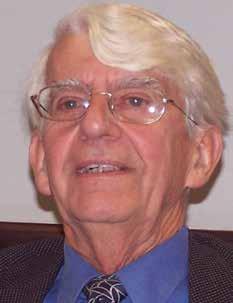
3 minute read
OBITUARY Kenneth John Aldred OBE
11 September 1937–26 January 2024
The NZIIA lost one of its life members with the passing of 86-year-old Ken Aldred. He was the institute’s Hawke’s Bay stalwart, an active member who brought skills from his United Kingdom experience to bear in creating a new branch.
Born in Bristol in the United Kingdom in 1937, Ken was brought up in difficult circumstances against the backdrop of the Second World War, and the austere post-war era. After leaving school at fifteen, he trained in men’s tailoring, then worked in many areas of industry and found himself ‘managing a factory in his very early twenties’. He later served as a company director, a work study efficiency expert and as an official in the Electrical Engineers Union. He also participated in non-governmental organisations, initially in a voluntary capacity.

Ken’s first involvement in campaigning was as part of the European Movement United Kingdom, a pro-European group which advocated for British entry to the European Economic Community. Once this goal was achieved on 1 January 1973, he co-ordinated events celebrating the outcome. In an extensive oral history interview conducted by the Imperial War Museum in 1988, he acknowledged that his political views were ‘rather widespread’. After dabbling with both major parties — his membership of both was ‘short-lived’ — he was determined to stand aside from party involvement, seeing an independent stance as helpful to his expanding non-governmental organisation role.
In 1981, amidst the furore over the deployment of US intermediate-range missiles in Europe as a counter to the Soviet Union’s stationing of SS20 missiles in its Eastern European satellites, Foreign Secretary Douglas Hurd asked the British Atlantic Committee to increase its public profile as a counter to the Committee on Nuclear Disarmament. Ken prepared a paper and, after it was accepted by the government, became the director of the BAC’s Regional Information Service, quickly raising its output. He believed strongly in deterrence, but remained moderate in his approach. It was important, in his opinion, that the United Kingdom maintained an independent nuclear capability.
These developments led to the creation of Peace Through NATO as a campaigning organisation, funded by the government. Ken became secretary-general, and as such responsible for the organisation’s name, personnel and policy. He carefully ensured that it was a non-bureaucratic organisation, capable of reacting to the challenges of the time. The organisation was active throughout the country, debating with CND. It had no members, just ‘self-motivating groups of supporters’. During this time Ken also double-hatted as chair of the British group involved in the Committee for a Community of Democracies, and served as its international assistant secretary.
In 1994 the British Atlantic Committee merged with Peace Through NATO to form the Atlantic Council of the United Kingdom, at which time Ken stepped aside. Shortly after his departure, he was made an officer of the Order of the British Empire in the 1994 New Year honours. He then became director of the United Kingdom Council for Arms Control, an independent research body operating within the Centre for Defence Studies at King’s College, London and also director and secretary of the British Council for Education in World Citizenship. He wrote and lectured extensively in these specialist areas, and was co-author of Superpowers in the Post-Cold War Era (1999).
Ken married Heather Brown, a New Zealander, and moved to Napier in January 2002. He continued working as an international security analyst, his main areas of interest relating to international security organisations with a particular focus on NATO, arms control, systems of government and the inter-relationship of citizenship and security issues. He remained a senior associate research fellow at King’s College, London, and became a member of the New Zealand Council for Security Co-operation in the Asia–Pacific.
Very soon after his arrival in Napier, Ken emerged as the driving force behind the establishment of the NZIIA’s Hawke’s Bay branch in 2003 and was its founding chair, a role he undertook until 2011. The new branch was notable for its innovative approach, as reflected in the double header meetings it organised to cater for its members’ differing situations. As chair he was a valued member of the institute’s National Council, his long non-governmental organisation experience proving valuable in the council’s deliberations. His contribution was recognised with his election as a life member in 2012.
Ken was actively involved in a range of voluntary community work in Napier. An active member of the Napier Rotary Club, he served as its president in 2008–09. He was also secretary and co-ordinator of Keep Napier Beautiful and chair of the Bay View Community Charitable Trust from 2002 to 2011.
Ken’s lively participation in the NZIIA’s affairs and thoughtful insights during discussions were always appreciated. He made a distinctive contribution and will be missed by all who were associated with him.
Ian McGibbon










